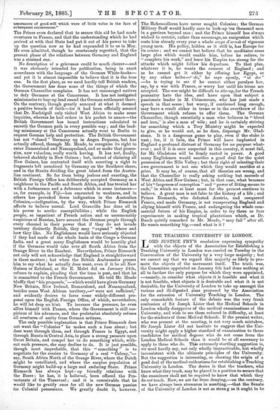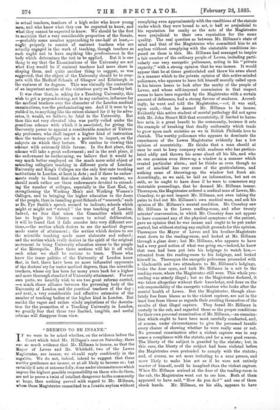THE TEACHING UNIVERSITY IN LONDON.
T4ORD JUSTICE FRY'S resolution expressing sympathy with the objects of the Association for Establishing a Teaching University in London was carried on Tuesday in the Convocation of the University by a very large majority ; but we cannot say that we regard this majority as likely to promote the objects of the movement itself. The truth was, the Committee appointed on January 6th had done nothing at all to further the only purpose for which they were appointed, —namely, to consider what objects it is feasible and what it is not feasible, what objects it is desirable and what it is not desirable, for the University of London to take up amongst the various and ill-digested aims proposed by the Association for the extension of University Teaching in London. The only remarkable feature of the debate was the very frank confession of Sir Joseph Lister that the Medical Schools in London wholly disapprove of the medical examinations of the University, and wish to see them reduced in difficulty, at least for the students of these Medical Schools. If the present writer, who was present at the meeting, is not very much mistaken, Sir Joseph Lister did not hesitate to suggest that the University might apply a higher standard of examination to those candidates for medical degrees who do not come from the London Medical Schools than it would be at all necessary to apply to those who do. This extremely startling suggestion is, we need hardly say, not only wholly impracticable, but wholly inconsistent with the ultimate principles of the University. But the suggestion is interesting, as showing the origin of a good deal of the medical enthusiasm for establishing a Teaching University in London. The desire is that the teachers, who know what they teach, may be placed in a position to secure that the examinees shall not be required to know that which they do not teach. Now, we are far from denying,—on the contrary, we have always been strenuous in asserting,—that the Senate of the University of London is nob as strong as it ought to be
in actual teachers, teachers of a high order who know young men, and who know what they can be expected to know, and what they cannot be expected to know. We should be the first to maintain that a very considerable proportion of the Senate, —probably some number approaching to one-half at least,— ought properly to consist of eminent teachers who are actually engaged in the. work of teaching, though teachers as such ought not to have anything like predominance in the body which determines the test to be applied. But it is one thing to say that the Examinations of the University are not what they would be if eminent teachers had more share in shaping them, and quite another thing to suggest, as was suggested, that the object of the University should be to compete with the Medical Schools of Glasgow and Edinburgh in the easiness of its degrees. This was virtually the contention of an important section of the victorious party on Tuesday last.
It was clear that, in asking for a Teaching University, this wish to get a preponderating, not to say exclusive, influence for the medical teachers over the character of the London medical examinations, was the predominating one. And if it were to be yielded to, to anything like the extent claimed for it by its advocates, it would, we believe, be fatal to the University. But then this not very elevated idea was partly veiled under the grandiose scheme with which it is associated, for giving the University power to appoint a considerable number of University professors, who shall impart a higher kind of instruction than the various colleges are in a position to impart, on the subjects on which they lecture. We confess to viewing*this scheme with extremely little favour. In the first place, this scheme will take a great endowment ; and in the next place, if the endowment be forthcoming, we believe that it would be very much better employed on the much more solid object of extending collegiate teaching in different parts of London. 'University and King's Colleges are the only first-rate teaching institutions in London, at least in Arts ; and if there be endowments ready to found first-class chairs in any number, we should much rather see these endowments devoted to extending the number of colleges, especially in the East End, to strengthening the Working Men's andWorking Women's Colleges, and to bringing the higher education to the doors of the people, than in founding great Schools of "research," such as Dr. Pye Smith's speech seemed to indicate, schools which might or might not " extend " the true teaching of London. Indeed, we fear that when the Committee which still has to begin its labours comes to actual deliberation, it will be found that it falls asunder into very different sections,—the section which desires to see the medical degrees made easier of attainment ; the section which desires to see the scientific teaching made more elaborate and refined ; and the section which really desires in the spirit of the original movement to bring University education nearer to the people of the Metropolis. How these sections will hit it off with each other we shall be curious to learn. Those who know the inner politics of the University of London know that, in fact, there have been no more influential opponents of the doctors' cry for easier medical degrees, than the scientific teachers, whose cry has been for many years back for a higher and more thorough standard of University attainment. For our own parts, we heartily wish to see two great reforms carried, —a much closer alliance between the governing body of the University of London and the practical teachers of the day ; and next, a very considerable and effective extension of the number of teaching bodies of the higher kind in London. But amidst the vague and rather windy aspirations of the Association for the promotion of a Teaching University in London, we greatly fear that these two limited, tangible, and useful reforms will disappear from view.



































 Previous page
Previous page